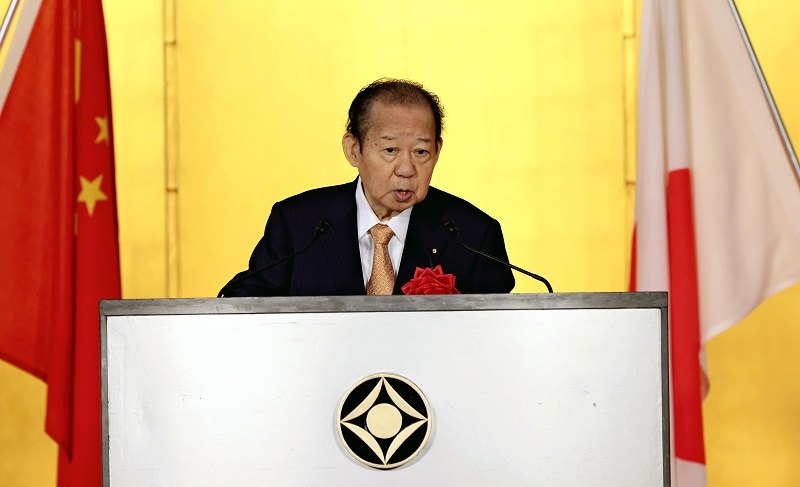Japanese lawmakers wary of Japan-China diplomacy amid rising bilateral tensions

Toshihiro Nikai, a former Secretary General of the Liberal Democratic Party, speaks at an event held to commemorate the 50th anniversary of the normalization of diplomatic relations between Japan and China in Chiyoda Ward, Tokyo, on Thursday.
16:18 JST, September 30, 2022
Japan and China marked the 50th anniversary of the normalization of diplomatic relations Thursday, during a period when diplomacy among lawmakers of the two nations is dwindling.
With tensions rising between the two nations and public sentiment worsening in Japan, lawmakers are increasingly wary of being labeled as “pro-China” politicians.
“Whatever the concerns may be, neighboring countries cannot move house,” Liberal Democratic Party former Secretary General Toshihiro Nikai said at a Tokyo event held to mark the milestone anniversary. “We must take a long view and not neglect efforts to cooperate with each other.”
About 850 people attended the event Thursday, including key members of the ruling and opposition parties such as former Prime Minister Yasuo Fukuda and former House of Representatives Speaker Yohei Kono, who served as liaisons between the two countries for many years.
LDP General Council Chairperson Toshiaki Endo, LDP Election Strategy Committee Chairman Hiroshi Moriyama, Komeito leader Natsuo Yamaguchi and Constitutional Democratic Party of Japan leader Kenta Izumi also attended the event.
Diplomacy conducted by Diet members has played a key role in preparing the way for government-to-government diplomacy.
In 2015, Nikai met with President Xi Jinping during a visit to China with a delegation of about 3,000 in a bid to improve Japan-China relations, which had cooled following the nationalization of the Senkaku Islands in Okinawa Prefecture.
Nikai tried to rouse support for a visit to Japan by Xi when he met the Chinese leader again during his China trip in 2019. However, an anticipated state visit to Japan by Xi was canceled in April 2020 amid the COVID-19 pandemic, which has made diplomacy among the nation’s lawmakers difficult.
An escalation of Chinese provocations, including intrusions into Japanese territorial waters around the Senkaku Islands, has also put a damper on diplomatic efforts by Japanese lawmakers.
Diet members with close ties to China have been labeled pro-China politicians, and some have faced criticism. When Yoshimasa Hayashi became foreign minister last year he resigned as chairman of the Japan-China Parliamentary Friendship Association to avoid such a predicament.
There are signs of change even in Komeito, which has established friendly relations with China. The party had sent a delegation to the country on an almost yearly basis but it has not done so amid the pandemic.
“Considering China’s current hegemonic stance, we have no choice but to keep our distance,” a Komeito source said.
The 1978 Japan-China Peace and Friendship Treaty clearly stated that neither of the nations “should seek hegemony in the Asia-Pacific region or in any other region,” Yamaguchi stressed at a party meeting Thursday. “Political leaders of both countries must play their roles responsibly,” he said.
Continuous dialogue, including lawmaker-level diplomacy, is essential to avoid confrontations.
Some people have called for maintaining a multilayered pipeline that goes beyond government-to-government ties.
Fukuda, who was prime minister when a joint statement between the two nations was signed in 2008, said Thursday: “It’s necessary to conduct a wide range of exchanges. Without dialogue, nothing will happen.”
"Politics" POPULAR ARTICLE
JN ACCESS RANKING





